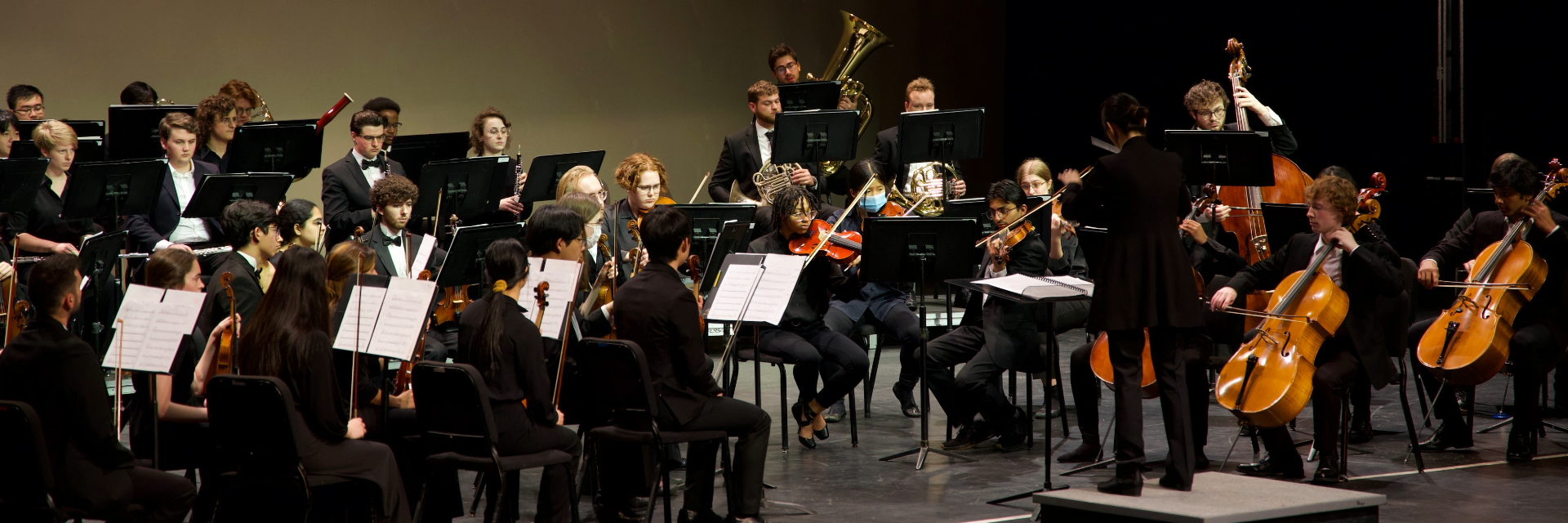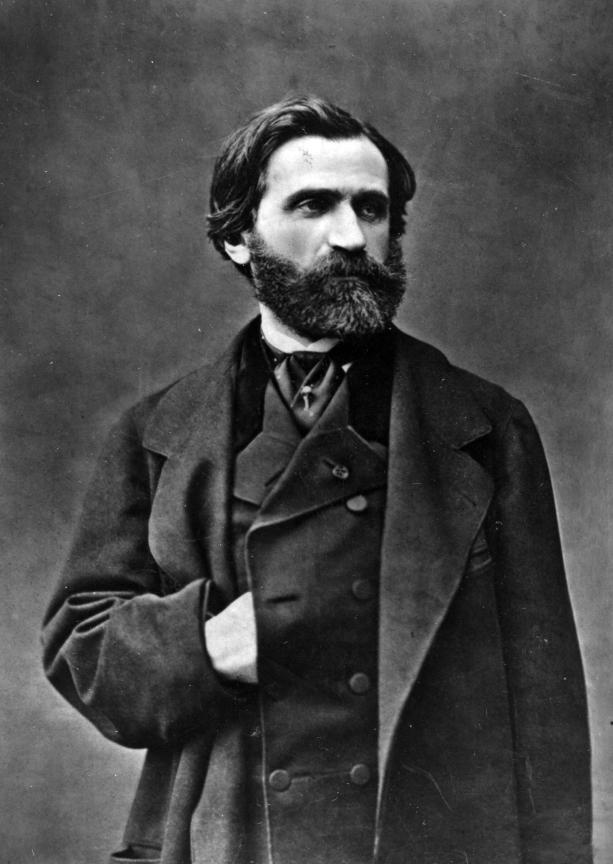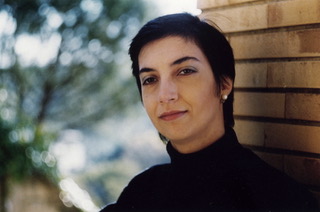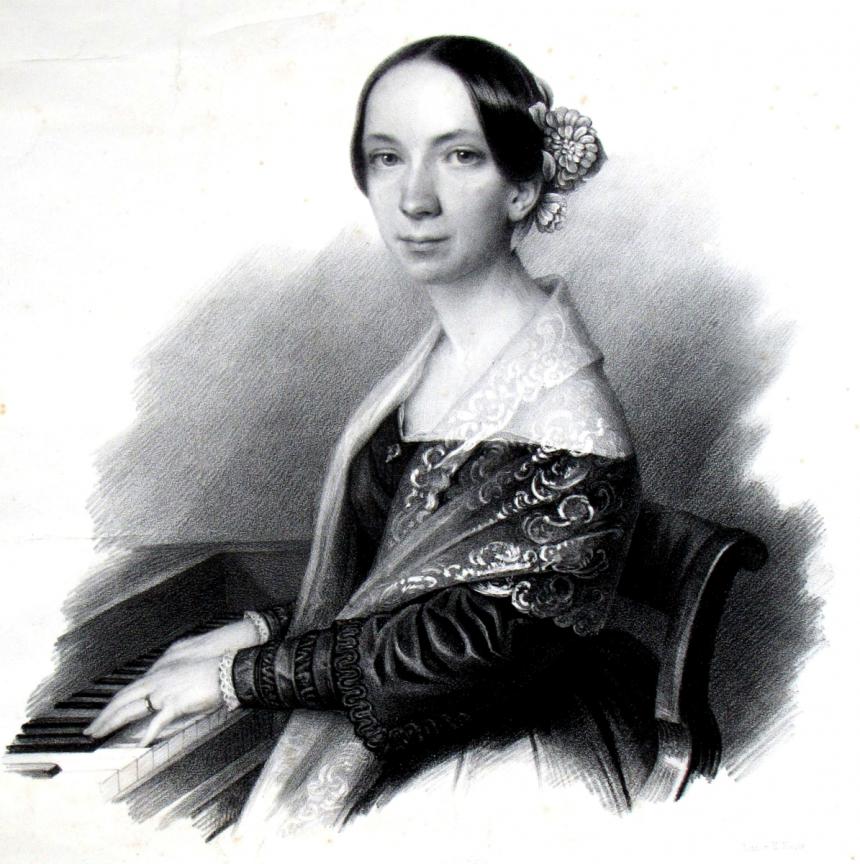Stay up to date with the School of Music!

Georgia Tech School of Music Presents:
Tour de Force
Georgia Tech School of Music Presents:
Tour de Force
Monday, November 13th 2023
7:30pm
Ferst Center for the Arts
Dr. Andrea Pérez Mukdsi, Conductor
For their second concert of the season, the GT Concert Orchestra explores a variety of themes, opening with the well-known Verdi Overture to La forza del destino. Also included in the program is Nora Ponte's Two Out of Three for String Orchestra, an arrangement commissioned for GT Concert Orchestra. In addition, this concert features two women composers, Nora Ponte and Emilie Mayer. The program concludes with movements I and IV from Emilie Mayer's Symphony No. 5 in F minor.
Program
[GT commission]
- I. Allegro agitato
- Finale, Allegro vivace
Program Notes – Overture to La forza del destino
La forza del destino translated to The force of destiny, is a frequently performed opera by Italian composer Giuseppe Verdi. The opera details how fate brings the characters together by chance, and Verdi’s Overture announces the tragic fate of destiny. The opera begins with a beautiful melody that builds, foreshadowing the fateful events that will occur in the opera’s storyline.
Program Notes – Two Out of Three for String Orchestra
“Two Out of Three” (2023) is a one-movement piece inspired by one of Nora Ponte's earlier compositions, a piano sonata originally conceived in three movements. Almost a decade later, Ponte was commissioned for a piece for a larger ensemble and decided to reintroduce the melodies of this piece with different instrumental colors. In this process, she realized that the musical ideas from two of the original movements flowed and connected with each other easily. Following the music's guidance, she focused on only two movements of the piano sonata and merged them into one: "Two Out of Three" for string orchestra (1995). Tonight's version of the piece has been specially arranged for the GaTech Concert Orchestra and includes four wind instruments.
The initial section of the piece introduces a slow-tempo theme, an autonomous musical idea with a clearly defined instrumental color and character, which later becomes the natural introduction to the second, faster motive. The two forces at work in "Two Out of Three" - the horizontal (the melodic idea) and the vertical (the harmonic pillars) – are born from the same material. The main musical theme - a descending fourth and an ascending second connected to another descending fourth followed by a descending second - is introduced in the first slow section and continues throughout the entire work. This melodic theme is also at the core of the harmonic language of the entire piece. The slow section (A-B-A') is followed by a bridge that links it to the fast movement. The fast section - also a three-part structure - is repeated with different variations and developments, leading up to the furious build-up of the final section: A-B-C-A'-B'-C'-A''-B''-C''-final.
"Two Out of Three," like an abstract painting, requires listening with an open mind. Its melodies and atmospheres convey emotions and ideas that can be interpreted in multiple ways. The various materials, techniques, and specific effects within the piece encourage individual interpretation. The essence of "Two Out of Three" is to instill a wide range of thoughts and emotional responses.
Program Notes – Symphony No. 5 in F Minor
Emilie Mayer's Symphony No. 5 in F minor is a captivating example of 19th century Romantic orchestral music. In this symphony, Mayer weaves a rich tapestry of emotions, moving from dramatic and tumultuous passages to moments of tender lyricism. Mayer's Symphony No. 5 stands as a testament to her remarkable talent and resilience in a male-dominated musical world. After the 19th century, her works have largely fallen out of popular repertoire, but in recent years, her works have again gained popularity in an effort to promote works of historically overlooked female composers.

Composer Bio – Giuseppe Verdi
Giuseppe Verdi is a 19th century Italian composer best known for his operas, and many of his compositions are among the most frequently performed in repertoire. He was born in Le Rencole, a small Italian village, and despite his humble beginnings, his musical talent was recognized at a young age. He received formal musical training in nearby Busseto, and in 1839, Verdi made his opera debut with Oberto, Conte di San Bonifacio, signaling the start of a successful career. His other works include Rigoletto, La Traviata, Aida, and Don Carlos, all of which remain staples of opera repertoire today.
A significant aspect of Verdi's legacy is his contribution to the Risorgimento, the Italian unification movement in the 19th century. His operas, such as "Nabucco" and "I Lombardi alla prima crociata," provided a rallying cry for the Italian people in their quest for independence, and his music became an emblem of national pride.
Throughout his life, Verdi faced personal tragedies, including the loss of his wife and children. However, these experiences added depth and emotional resonance to his compositions, resulting in masterpieces that explore themes of love, sacrifice, and human nature. His career and work had strong impacts on the world of opera that are still felt to this day.

Composer Bio – Nora Ponte
Winner of the first Christoph Delz International Composition Competition (Basel, Switzerland) with her piano concerto Tracce, and recipient of the Municipal Prize of Composition of Buenos Aires, Nora Ponte’s works have been performed around the world. She received grants from different foundations and universities, including SUNY at Buffalo, where she was a Dean’s Fellowship recipient.
Many of the most important music festivals have featured her music. Recently, she has been part of the XXI Latinoamerican Music Festival of Caracas, Venezuela, with her piece for baguala player and chamber ensemble Bajo el cerro de los siete colores (At the base of the hill of seven colors) and the I International Meeting of Women Guitarists in Buenos Aires, Argentina, with Recondita Chitarra (Recondite Guitar) for solo guitar. Recondita Chitarra recording has been released last year in the CD Compositoras: Obras para guitarra compuestas por mujeres argentinas (Women composers: pieces for guitar composed by Argentinian Women) and has had many live performances in Argentina by guitarist Silvia Fernández.
Another of her last works, O-Marimba for solo marimba, has also been recorded (by marimbist Fiona Pui-Yee Foo) and released in 2022 in CD: Fiery Mallets: Contemporary Pieces for Marimba. Ponte’s new Trio for bass clarinet, bassoon and cello has been premiered last year in Salta, Argentina, and this year in Brasil, Sao Paulo and Rio de Janeiro, together with her last piece for electronics La Pacha es el Otre (The Mother Earth is the other).
Ponte has earned a Ph. D. in Music Composition from the State University of New York at Buffalo and a BA in Music Composition from the Argentine Catholic University at Buenos Aires. She also studied Composition with Giacomo Manzoni and Electronic Music at the Santa Cecilia School of Music with Riccardo Bianchini (Italy). Currently she is a Professor of Music Composition at the University of Puerto Rico.
More about Nora at http://noraponte.blogspot.com/

Composer Bio – Emilie Mayer
Emilie Mayer, a Romantic German composer, is a remarkable and pioneering figure in the history of classical music, whose compositions have often been overshadowed by her male contemporaries. Born in the 19th century in Friedland, a small German town, she defied societal norms and gender expectations to establish herself as a popular composer at the time.
Mayer's musical talent was evident from an early age, and she received her early training in Berlin under the guidance of renowned composers. Her exceptional abilities soon gained recognition, and she composed a substantial body of work across various genres, including symphonies, chamber music, and vocal compositions.
Despite the gender biases and challenges that she encountered, Emilie Mayer's determination and talent propelled her to become the first woman to be admitted to the prestigious Berlin Sing-Akademie, a groundbreaking achievement for her time. Her music was performed in prestigious venues across Europe, earning her recognition and admiration from fellow musicians and composers, including Franz Liszt and Robert Schumann. Though her music unfortunately became overshadowed by male composers, her works have recently began making a comeback in an effort to recognize and spotlight female composers.
Ensemble Members
| Violin I | Major |
| Janice Lee, Co-Concertmaster | Biomedical Engineering |
| Brianna Zhang, Co-Concertmaster | Computer Science |
| Euan Ham | Computer Science |
| Sneha Vashistha | Biomedical Engineering |
| Chrisopher Linder | Computer Science |
| John Auckly | Aerospace Engineering |
| Sanai Williams | Architecture |
| Wesley Chukumah | Biomedical Engineering |
| Addison Harmer | Physics |
| Antoine Marin | Aerospace Engineering |
| Violin II | |
| Michelle Ku, Principal | Aerospace Engineering |
| Stephen Linder | Computer Science |
| Joshua Kinishita | Music Technology |
| Katherine Stone | Biology |
| Oluwaferanmi Akande | Biomedical Engineering |
| Arshia Rahman | Computer Science |
| Nishka Soni | Industrial Engineering |
| Gabrielle Wong | Chemical Engineering |
| Tanvi Thallapally | Biochemistry |
| Varsha Jacob | Computer Science |
| Viola | |
| Nicole Redder, Principal | Operations Research |
| Katherine Poch | Environmental Science |
| Angela Xu | Computer Science |
| Katelyn Potts | Electrical Engineering |
| Cello | |
| Peter Gardener, Principal | Chemical and Biomolecular Engineering |
| Abigail Sim | Biology |
| Roy Mazor | Mechanical Engineering |
| Sophia Anderson | Materials Science and Engineering |
| Leena Khan | Biology |
| Jamie King | Chemical Engineering |
| Bass | |
| Genevieve Metayer, Principal | Biomedical Engineering |
| Luhee Shin | Music Technology |
| Flute | Major |
| Javier Pratdesaba | Chemical and Biomolecular Engineering |
| Zephyr Smith | Music Technology |
| Oboe | |
| Raymond Yang | Biomedical Engineering |
| Clarinet | |
| Jason Zhang | Computer Science |
| Bassoon | |
| Vishaal Kareti | |
| Horn | |
| Brooke Hobbs | Biomedical Engineering |
| Jack Parker | Industrial Engineering |
| Trumpet | |
| Mason Beyke | Psychology |
| Trombone | |
| Zixiao Yang | Mechanical Engineering |
| Tuba | |
| Alex Coles | Industrial Engineering |
Georgia Tech School of Music
Through interdisciplinary degree programs, outstanding performance ensembles, and innovative research endeavors, the Georgia Tech School of Music cultivates a rich legacy of musical traditions and develops cutting-edge technologies to help define music's future. The School serves students in bachelors, masters, and doctoral programs in music technology and offers innovative performance opportunities, courses, and cultural and artistic experiences for students throughout the Institute.